

About Us – Brewminate. A museum that seeks to understand American history through the lens of the African American experience. National Women's History Museum. Department History. Since its creation in 1789, the Department of State has carried out a series of reorganizations and has created new offices and bureaus to deal with new diplomatic challenges.
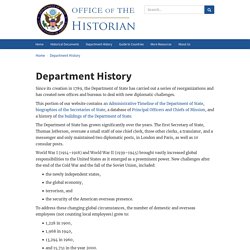
History News Network. Sage American History. Brief Timeline of American Literature and Events: 1750-1759. Spanish American War. Andrew Jackson: Campaigns and Elections. The Campaign and Election of 1824: The Virginia presidential dynasty was coming to an end with the second term of James Monroe.
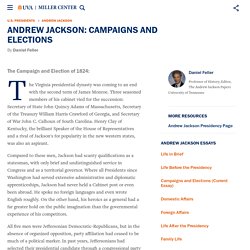
Three seasoned members of his cabinet vied for the succession: Secretary of State John Quincy Adams of Massachusetts, Secretary of the Treasury William Harris Crawford of Georgia, and Secretary of War John C. Calhoun of South Carolina. History of the United States, Vol. IV : Beard, Charles A., and Beard, Mary R. : Free Download, Borrow, and Streaming. LibriVox recording of History of the United States Part IV, The West and Jacksonian Democracy, by Charles A.
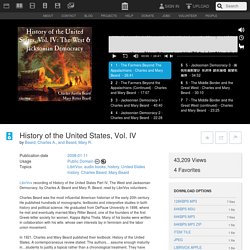
Beard and Mary R. Beard, read by LibriVox volunteers. Charles Beard was the most influential American historian of the early 20th century. He published hundreds of monographs, textbooks and interpretive studies in both history and political science. A Short History of the United States : Edward Channing : Free Download, Borrow, and Streaming.
The Effects of Western Expansion on American Politics. Welcome to the Revolutionary War Archives! Andrew Jackson: Impact and Legacy. A History Blog About the Bay State. Mississippi History Now. Mississippi History Now. American Historama: United States History for kids. Your Refuge for Rational Discourse. US History II (OS Collection) American Imperialism in Philippines by June An on Prezi. American Imperialism: This Is When It All Began. This article is part of The Nation’s 150th Anniversary Special Issue.
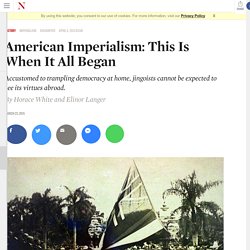
Download a free PDF of the issue, with articles by James Baldwin, Barbara Ehrenreich, Toni Morrison, Howard Zinn and many more, here. Hawaiian Annexation Editorial (Horace White)Excerpted from the November 25, 1897 Issue. Rise of Unions - AP U.S. History Topic Outlines. Welcome to A+E Networks. Why Did the French and Indian War Take Place? – History of Massachusetts Blog.
The French and Indian War, which took place between 1754-1763, began due to a conflict between England and France over control of the Ohio River Valley.
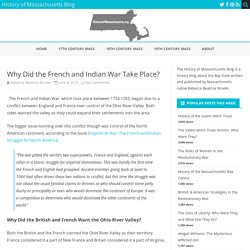
Both sides wanted the valley so they could expand their settlements into the area. The bigger issue looming over this conflict though was control of the North American continent, according to the book Empires At War: The French and Indian Struggle for North America: “The war pitted the world’s two superpowers, France and England, against each other in a titanic struggle for imperial domination. Assassination of President Lincoln. On Friday April 14, 1865, the United States of America was shocked when President Abraham Lincoln was assassinated.
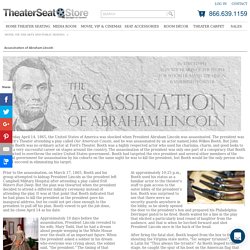
The president was at Ford's Theater attending a play called Our American Cousin, and he was assassinated by an actor named John Wilkes Booth. But John Wilkes Booth was no ordinary actor at Ford's Theater. Booth was a highly respected actor who used his charisma, charm, and good looks to forge a very successful career on stages around the country. The assassination of the president was only one part of a conspiracy that Booth concocted to overthrow the entire United States government. American Historama: United States History for kids. Native America before European Colonization. Cahokia - City of the Sun. The Black Past: Remembered and Reclaimed.
The Underside of Urban Life. Photo by Jacob Riis [courtesy of Yale University] Sewing and Starving in an Elizabeth Street Attic Lights, trolleys, skyscrapers, romance, action.
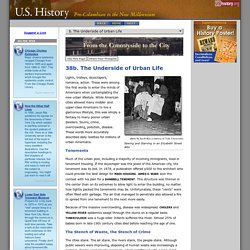
These were among the first words to enter the minds of Americans when contemplating the new urban lifestyle. While American cities allowed many middle- and upper-class Americans to live a glamorous lifestyle, this was simply a fantasy to many poorer urban dwellers. Slums, crime, overcrowding, pollution, disease. Martin A. Klimke. America's Best History. American History USA. Brief Timeline of American Literature and Events, 1620-1920. Brief Timeline of American Literature and Events: Pre-1620 to 1920 This timeline provides a short chronology of events in American history and literature.
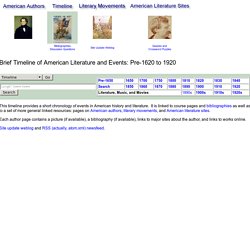
It is linked to course pages and bibliographies as well as to a set of more general linked resources: pages on American authors, literary movements, and American literature sites. Each author page contains a picture (if available), a bibliography (if available), links to major sites about the author, and links to works online.
Eagleton Institute of Politics. U.S. History Textbooks. Facts On File History Database Center. Olive Branch Petition One of the most important documents of the American Revolution, the Second Continental Congress sent the Olive Branch Petition to King George III in July 1775.
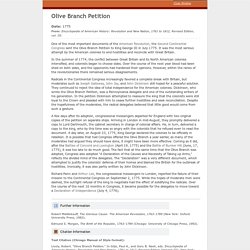
PBS Election. The Contenders - 16 for '16 PBS, in partnership with OZY Media, is proud to present The Contenders-16 for '16, a documentary series that examines the most compelling and influential presidential campaigns in modern history.
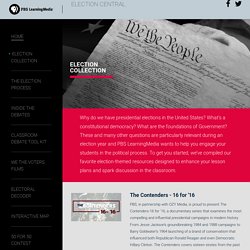
From Jesse Jackson’s groundbreaking 1984 and 1988 campaigns to Barry Goldwater’s 1964 launching of a brand of conservatism that influenced both Republican Ronald Reagan and even Democratic Hillary Clinton. SAT Subject Test: U.S. History: Road to Revolution, 1770–1775. Road to Revolution, 1770–1775 From 1770 to 1772, the British ignored the colonies and tension cooled substantially. However, in the fall of 1772, Lord North began preparations to pay royal governors out of customs revenue rather than let the colonial assemblies control payment. This would deny the assemblies the “power of the purse,” breaking assemblies’ ability to effectively check royal power by withholding, or threatening to withhold, payment. In response to this threat, Samuel Adams urged every Massachusetts community to appoint a committee to coordinate colony-wide measures protecting colonial rights. Nation of Nations. Free Primary Source Materials For Social Studies Teachers.
Gilded Age Scandal and Corruption - AP U.S. History Topic Outlines - Study Notes. The Tweed Ring and Machine Politics The late nineteenth and very early twentieth centuries in America are often referred to as the “Gilded Age.” The origin of this name is usually attributed to Mark Twain who co-authored a novel entitled The Gilded Age. The term is metaphoric on several levels. It can be taken to reference an obsession with appearances.
Unlike “golden,” which has positive associations of beauty and value, the word “gilded” carries connotations of cheap commercialization, shoddiness, and fakery. Concern with gold was certainly heightened by U.S. money being minted in scarce gold coins. The American Yawp. Native America before European Colonization. National geographic documentary amazon tribes - Beautiful girls Tribe. America's Homepage and the Virtual Tour of Washington, D.C. Archiving Early America - Your Window Into America's Founding Years. A History Blog About the Bay State. Colonial America for kids *** American History. Three Examples of Imperialism by the US in the Late 1800s.
UH - Digital History. Digital History. Mississippi History Now. A Brief History of Jim Crow. “I can ride in first-class cars on the railroads and in the streets,” wrote journalist T. McCants Stewart. “I can stop in and drink a glass of soda and be more politely waited upon than in some parts of New England.” Perhaps Stewart’s comments don’t seem newsworthy. Consider that he was reporting from South Carolina in 1885 and he was black. Stewart had decided to tour the South because he feared for freedmen’s liberties.
After a few weeks on the road, Stewart decided they would. Stewart was wrong. “Jim Crow” was a derisive slang term for a black man. In 1890, in spite of its 16 black members, the Louisiana General Assembly passed a law to prevent black and white people from riding together on railroads. Two years later, the court seemed to seal the fate of black Americans when it upheld a Mississippi law designed to deny black men the vote.
Jim Crow laws touched every part of life. In Richmond, one could not live on a street unless most of the residents were people one could marry. Silverites, Populists, and the Movement for Free Silver. Gold bugs v. Silverites Political battles over currency issues became intensely divisive during the last quarter of the 19th century as industrialization accelerated in the Northeast, while the South and newly settled areas of the Midwest remained dependent on farming. From 1873 through the late 1890s, the U.S. suffered through two major economic depressions that heightened sectional and class conflict. By the 1896 election, designated by historian Walter Dean Burnham as “the first confrontation . . . among organized political forces over industrial capitalism,” positions on currency had solidified into a “battle of the standards.”
“Gold bugs” believed that a “sound” national economy must be based on the gold standard to ensure the dollar’s stability, guarantee unrestricted competition in the marketplace, and promote economic liberty. Farmers for Free Silver. World History Timeline South America History AD 1453. American Revolution History - American Revolution. For more than a decade before the outbreak of the American Revolution in 1775, tensions had been building between colonists and the British authorities. Attempts by the British government to raise revenue by taxing the colonies (notably the Stamp Act of 1765, the Townshend Tariffs of 1767 and the Tea Act of 1773) met with heated protest among many colonists, who resented their lack of representation in Parliament and demanded the same rights as other British subjects. Colonial resistance led to violence in 1770, when British soldiers opened fire on a mob of colonists, killing five men in what was known as the Boston Massacre.
After December 1773, when a band of Bostonians dressed as Mohawk Indians boarded British ships and dumped 342 chests of tea into Boston Harbor, an outraged Parliament passed a series of measures (known as the Intolerable, or Coercive Acts) designed to reassert imperial authority in Massachusetts. Boundless U.S. History Hub. USA history. Teacher Access. Social Studies - FREE Lesson Plans Activities Games Powerpoints Handouts - for Kids and Teachers. Free Storage and Email from Google. The Age of Imperialism. The Fateful Year 1898: The United States Becomes an Imperial Power. The Road to Revolution. Publisher of streaming video, audio, and text library databases in music, counseling, history, business, and more. Encyclopedia of Philosophy. Learn American History on About.com. Events Leading to the American Revolution Timeline. The American Revolution - US History Scene.
The American Revolution was by no means a purely American-British conflict. The American Revolution. Proclamation Line of 1763, Quebec Act of 1774 and Westward Expansion - 1750–1775. The British won vast territory in North America after the Seven Years’ War, but with the land came numerous problems of how to govern it. Facing the New Millennium. American History Timeline. Archaeological evidence has shown that systems similar to the quipu were in use in the Andean region from about 3000 BC.
(Wikipedia) Quipu: an ancient Inca device for recording information, consisting of variously coloured threads knotted in different ways. From beginning of fifteenth century at latest, Iroquois Confederation formed according to Engels. American Revolutions: The Other Side of Modern, 1900-1945; essay by Scott A. Shields. Crocker Art Museum. Documents. Progressive Era Politics. Digital History. Prehistoric Europeans. First Native Americans (1 of 3) Native America before European Colonization. History Matters: The U.S. Survey Course on the Web.
The World of 1898: The Spanish-American War. Antiwar and Radical History Project. Aquatic "invasion" of Fort Lewis, July 13, 1969, copyright (c) Steve Ludwig Antiwar movements have never been separate from movements for civil rights, union recognition, and social change. Bracero History Archive. The Black Past: Remembered and Reclaimed. Pacific Northwest History - United States History - Research Guides at University of Washington Tacoma. America's Story from America's Library. AP U.S. History - Study Notes.
History on Trial. United States American History. Japanese Sign Final Surrender 日本の降伏. The Valley of the Shadow: Two Communities in the American Civil War. American Revolution: Early Colonial Era. American Freedom Stories: Alabama. Paspahegh/English Timeline. A People's History of the United States. Gale Cengage Product Failure. Texas State Historical Association (TSHA)